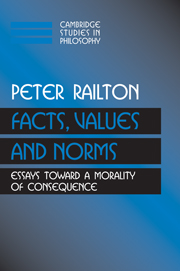Book contents
- Frontmatter
- Contents
- Foreword
- Part I Realism about Value and Morality
- 1 Moral Realism (1986)
- 2 Facts and Values (1986)
- 3 Noncognitivism about Rationality: Benefits, Costs, and an Alternative (1993)
- 4 Aesthetic Value, Moral Value, and the Ambitions of Naturalism (1997)
- 5 Red, Bitter, Good (1998)
- Part II Normative Moral Theory
- Part III The Authority of Ethics and Value – The Problem of Normativity
- Index
5 - Red, Bitter, Good (1998)
Published online by Cambridge University Press: 18 December 2009
- Frontmatter
- Contents
- Foreword
- Part I Realism about Value and Morality
- 1 Moral Realism (1986)
- 2 Facts and Values (1986)
- 3 Noncognitivism about Rationality: Benefits, Costs, and an Alternative (1993)
- 4 Aesthetic Value, Moral Value, and the Ambitions of Naturalism (1997)
- 5 Red, Bitter, Good (1998)
- Part II Normative Moral Theory
- Part III The Authority of Ethics and Value – The Problem of Normativity
- Index
Summary
Valuing and evaluation are pervasive features of our lives, yet their purported object, value, has proven puzzling. Many philosophers have concluded that we do best to explain it away – to develop an understanding of valuing and evaluation without objectifying value. A principal motive for such “anti-reificationism” has been the belief that attributions of value are essentially expressions of subjective responses to the nonevaluative features of the world. No evaluative objects are needed to answer to these judgments: value is projected upon the world, not discovered in it.
Recently, however, interest has grown in philosophical approaches to value that seek to explain it as involving a subjective response without thereby explaining it away. Value might be akin to a secondary quality, such as color. Of course color attribution is linked to a sensibility on our part, but this need not in itself impugn our familiar ways of talking about color – that objects indeed are colored, that their colors can (and often do) guide our color judgments, and so on. Perhaps we could be led to question these familiar ways of talking about color if we could be convinced that color perception or color discourse somehow systematically misrepresents the world. But such claims would require substantial further argument and do not follow simply from the observation that rationally optional sensibilities are implicated in color perception.
How good is the analogy between color and value? An adequate answer would involve giving an account of both, and that clearly is too large a project for this paper.
- Type
- Chapter
- Information
- Facts, Values, and NormsEssays toward a Morality of Consequence, pp. 131 - 148Publisher: Cambridge University PressPrint publication year: 2003
- 1
- Cited by



